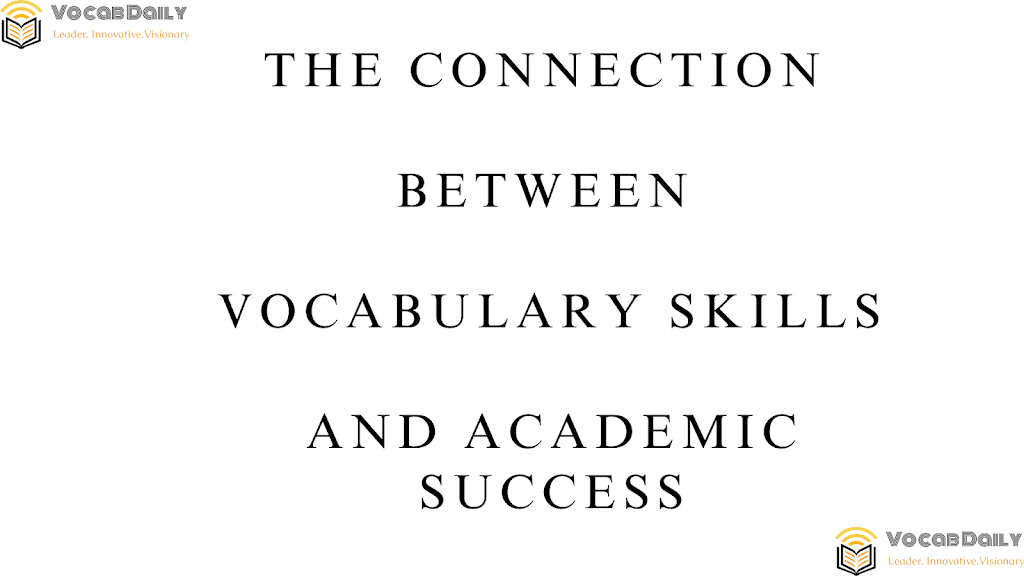The Connection Between Vocabulary Skills and Academic Success
Vocabulary skills play a pivotal role in academic success, influencing various aspects of a student’s educational journey. This article explores the intricate relationship between vocabulary proficiency and academic achievement, highlighting why a robust vocabulary is essential for excelling in school and beyond.
Foundation for Reading Comprehension
A strong vocabulary forms the bedrock of reading comprehension. Students with extensive vocabularies are better equipped to understand complex texts across various subjects. When encountering unfamiliar words, these students can often deduce meanings from context, allowing for smoother and more effective reading. This skill is particularly crucial as students progress to higher grades where texts become increasingly sophisticated and subject-specific terminology becomes more prevalent.
Enhanced Written Expression
Vocabulary richness significantly impacts a student’s ability to express ideas in writing. A diverse vocabulary allows for more precise and nuanced communication, enabling students to articulate complex thoughts and arguments effectively. This skill is invaluable across all academic disciplines, from crafting persuasive essays in language arts to explaining scientific concepts in lab reports.
Improved Listening and Speaking Skills
Strong vocabulary skills also enhance a student’s listening and speaking abilities. Students with a broad vocabulary can better understand lectures, participate more effectively in class discussions, and articulate their ideas more clearly during presentations. This verbal proficiency not only contributes to better grades but also builds confidence in academic settings.
Cross-Disciplinary Academic Benefits
Vocabulary knowledge is not confined to language arts; it permeates all academic subjects. In science, understanding technical terms is crucial for grasping complex concepts. In mathematics, comprehending word problems often hinges on vocabulary knowledge. History and social studies require familiarity with era-specific and cultural terms. A strong vocabulary, therefore, acts as a bridge connecting various academic disciplines.
Standardized Test Performance
Vocabulary skills have a direct impact on standardized test performance. Many academic assessments, including college entrance exams like the SAT and ACT, heavily emphasize vocabulary in their verbal sections. Students with strong vocabulary skills often perform better on these tests, which can significantly influence college admissions and scholarship opportunities.
Critical Thinking and Analysis
A robust vocabulary facilitates higher-order thinking skills. It enables students to engage in more sophisticated analysis and critical thinking. The ability to understand and use nuanced language allows for deeper exploration of ideas, more effective comparison and contrast of concepts, and more insightful interpretations of complex information.
Long-Term Academic and Career Success
The benefits of strong vocabulary skills extend beyond immediate academic performance. A rich vocabulary continues to support lifelong learning, enhancing comprehension and communication abilities throughout higher education and into professional careers. It provides a foundation for continuous intellectual growth and adaptability in an ever-evolving academic and professional landscape.
Cognitive Development and Memory
Vocabulary acquisition is closely linked to cognitive development. Learning new words and their meanings exercises the brain, improving memory and cognitive flexibility. This enhanced cognitive function can have positive spillover effects on other areas of academic performance, including problem-solving and information retention.
Social and Emotional Intelligence
While often overlooked, vocabulary skills also contribute to social and emotional intelligence. A diverse vocabulary allows students to better express their emotions, understand others, and navigate social situations in academic settings. This emotional articulation can lead to improved relationships with peers and teachers, creating a more positive and supportive learning environment.
Academic Confidence and Motivation
As students develop stronger vocabulary skills, they often experience increased confidence in their academic abilities. This confidence can boost motivation, encouraging students to tackle more challenging academic tasks and pursue advanced learning opportunities. The positive feedback loop between vocabulary skills, academic success, and confidence can significantly enhance overall educational outcomes.
Developing a strong vocabulary is not just about memorizing words; it’s about building a fundamental tool that enhances every aspect of academic performance. From improving reading comprehension and written expression to boosting critical thinking and test scores, vocabulary skills are integral to academic success.
For more insights on enhancing vocabulary skills and supporting academic achievement, visit www.https://vocabdailyofficial.blogspot.com/. To access our comprehensive vocabulary workbook designed to boost academic performance, check out https://shorturl.at/0a0Qc.


Leave a Reply